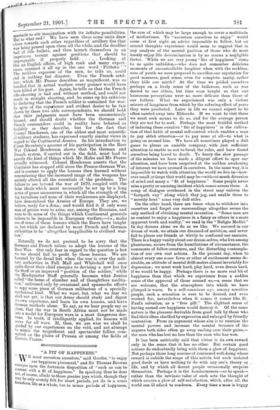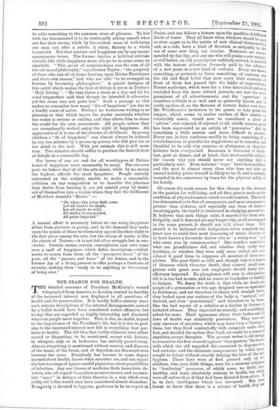"A PIT OF HAPPINESS."
WE must accustom ourselves," said Goethe, " to enjoy our happiness piecemeal," and Sir Thomas Browne enlarges upon the fortunate disposition of " such as can be content with a fit of happiness." In speaking thus he does not, of course, allude to those greater joys which, though they may be only acutely felt for short periods, yet do in a sense transform life as a whole, but to minor periods of happiness,
the sum of which may be large enough to cover a multitude of misfortunes. To "accustom ourselves to enjoy" would seem at first sight an advice impossible to follow, but on second thoughts experience would seem to suggest that in any analysis of the mental position of those who do most keenly enjoy life determination is by no means a negligible factor. 'While we are very young "fits of happiness" come to us quite unbidden,—who does not remember delicious moments of uncontrollable laughter when with the reckless. ness of youth we were prepared to sacrifice our reputation for good manners, good sense, even for complete sanity, rather than hide our mirth ? At the time we prided ourselves perhaps on a lively sense of the ludicrous, such as was denied to our elders, but time soon taught us that our humorous perceptions were no more delicate than those of our fathers. What we experienced was only a violent seizure of happiness from which by the sobering effect of years they were precluded. Later in life we cannot expect to be often carried away into Eldorado. If we want to visit there we must seek means to do so, and for the average person they are not far to seek. Perhaps the most fruitful method of inducing these curative "fits of happiness" is the cultiva- tion of that habit of mental self-control which enables a man to pay strict attention—or to pay none at all—to what is going on around him. We have all sometimes played a dull game to please an amiable company, with just sufficient attention to enable us not to break the rules, and have found ourselves being bored to death. To hurry the slow passage of the minutes we have made a diligent effort to spur our attention, and have been surprised at the sudden awakening of interest we have aroused in ourselves. In the same way, it is impossible to watch with attention the world we live in—how- ever small or large that world may be—without much diversion of mind and many a "fit of happiness." Some people never miss a pretty or amusing incident which comes across them. A scrap of dialogue overheard in the' street may enliven the "footpath way" along which they jog, and enable them to "merrily heat" some very dull stiles.
On the other hand, there are times when to withdraw into ourselves and forget our surroundings altogether seems the only method of obtaining mental recreation. " Some men are as content to enjoy a happiness in a fancy as others in a more apparent truth and reality," we read in the " Religio Medici."
In day dreams alone we do as we like. We succeed in our dream of work, we attain our dreamed-of ambition, and never fail to please our friends or wittily to confound our enemies.
There is a happy vanity about our dream-selves, who live among phantasms, secure from the humiliations of circumstance, the comments of fellow-creatures, and the disturbing contempla. .
tion of our own real actions. In the present day, when to almost every one some form or other of excitement seems de- sirable, an attitude of mental drift makes almost invariably for depression ; we must work hard, play hard, even dream hard, if we would be happy. Perhaps there is no more real bit of happiness than that which we experience from a sudden sense of the approval of those around us,—a sense that we are welcome, that the atmosphere into which we have . plunged is warm. In a self-conscious age, among sensitive people, such a sensation is sure to be desired, and even worked for; nevertheless when it comes it comes like St.
Paul's salvation, as a "free gift." The slightest sense of having earned our happiness would- destroy it. Of the same
nature is the pleasure derivable from good talk by those who find their ideas clarified by expression and enlarged by friendly contention. From an argument whose aim is to exercise the
mental powers and increase the mental treasure of the arguers both sides often go away smiling. over their gains,— the man who has lost no less than the man who has won.
It has been satirically said that virtue is its own reward- only in the sense that it has no other. But certain good
actions do undoubtedly bring with them a glow of happiness.
Not perhaps those long courses of continued well-doing whose reward is outside the scope of this article, but such isolated good deeds as have nothing to do with any one's theory of
life, and by which all decent people occasionally surprise themselves. Perhaps it is the handsomeness—so to speak—
rather than the intrinsic value of such acts the thought of which creates, a glow of self-satisfaction, which, after all, the world can ill afford to condemn. Every time a man is happy he adds something to the common store of pleasure. To live with the discontented is to be continually asking oneself what one has done wrong, while by his evident sense of well-being one man can offer a subtle, if silent, flattery to a whole household. Not that content and happiness are by any means synonymous terms. The former implies a habitual attitude towards life, while happiness must always be in some sense an interlude. " This grace of contentedness was the sum of all the old moral philosophy," says Jeremy Taylor ; " the property of those who can sit at home feasting upon Divine Providence and their own reason," and who are able "to be revenged on fortune by becoming philosophers." A quaint instance of this spirit which makes the best of things is given in Taylor's " Holy Living " : " He that threw a stone at a dog and hit his cruel stepmother said that though he intended it otherwise yet the stone was not quite lost." Such a passage as this makes us remember how many " fits of happiness " are due to a kindly sense of satire. Perhaps no humorous writing is so pleasing as that which leaves the reader uncertain whether the writer is serious or smiling, and thus allows him to share the credit for his own amusement. All people, unless they are exceptionally wicked, enjoy the sight of happiness. An appearance of it is one of the charms of childhood. In young children a " fit of happiness" can almost always be induced in, say, ten minutes by a grown-up person who will give his or her mind to the task. With pet animals this is still more true. Two minutes should suffice to produce the desired show of delight in a reasonable dog.
For lovers of any art and for all worshippers of Nature hours of happiness must necessarily be many. For our own part, we believe that of all the arts music, while by no means the highest, affords the moat happiness. People entirely unlearned on the subject, unable to make a reasonable criticism on any composition or to describe the pleasure they derive from hearing it, are yet carried away by music out of themselves into a region where they feel the fulfilment of Matthew Arnold's " Desire " :- " Oh where thy voice doth come Let all doubts be dumb, Let all words be mild, All strifes be reconciled, All pains beguiled."
A mental effort is necessary before we can wring happiness either from pictures or poetry, and in the demand they make upon the minds of those to whom they appeal lies their right to the first place among the arts, but the charm of music is like the charm 'of Nature,—it is not felt after struggle but in sur- i ender. Certain scenes, certain atmospheres, cast over some men a spell of happiness which defies description,—which seems to screen from them all the " prospects drear " of the past, all the " guesses and fears " of the future, and in the intense joy of a living present to offer perhaps a foretaste of eternity, making them " ready to be anything in the ecstasy of being ever."







































 Previous page
Previous page